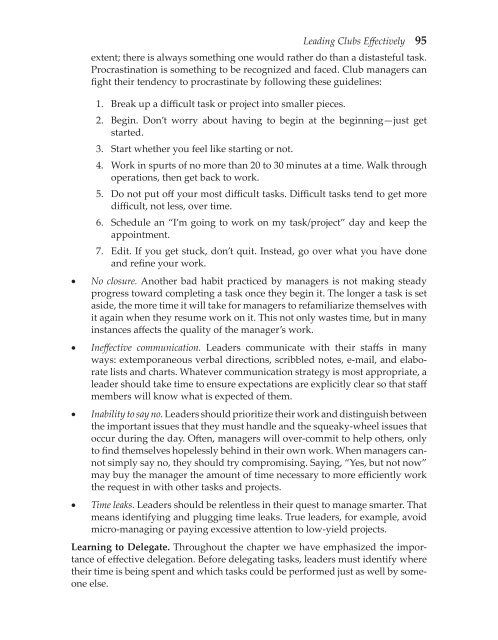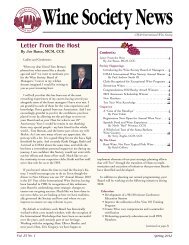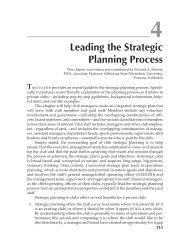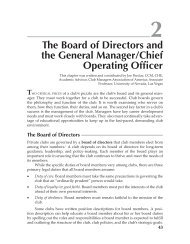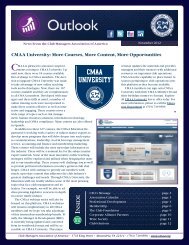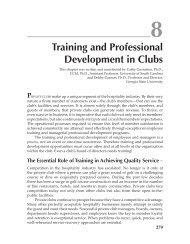Leading Clubs Effectively - Club Managers Association of America
Leading Clubs Effectively - Club Managers Association of America
Leading Clubs Effectively - Club Managers Association of America
Create successful ePaper yourself
Turn your PDF publications into a flip-book with our unique Google optimized e-Paper software.
<strong>Leading</strong> <strong><strong>Club</strong>s</strong> <strong>Effectively</strong> 95extent; there is always something one would rather do than a distasteful task.Procrastination is something to be recognized and faced. <strong>Club</strong> managers canfight their tendency to procrastinate by following these guidelines:1. Break up a difficult task or project into smaller pieces.2. Begin. Don’t worry about having to begin at the beginning—just getstarted.3. Start whether you feel like starting or not.4. Work in spurts <strong>of</strong> no more than 20 to 30 minutes at a time. Walk throughoperations, then get back to work.5. Do not put <strong>of</strong>f your most difficult tasks. Difficult tasks tend to get moredifficult, not less, over time.6. Schedule an “I’m going to work on my task/project” day and keep theappointment.7. Edit. If you get stuck, don’t quit. Instead, go over what you have doneand refine your work.• No closure. Another bad habit practiced by managers is not making steadyprogress toward completing a task once they begin it. The longer a task is setaside, the more time it will take for managers to refamiliarize themselves withit again when they resume work on it. This not only wastes time, but in manyinstances affects the quality <strong>of</strong> the manager’s work.• Ineffective communication. Leaders communicate with their staffs in manyways: extemporaneous verbal directions, scribbled notes, e-mail, and elaboratelists and charts. Whatever communication strategy is most appropriate, aleader should take time to ensure expectations are explicitly clear so that staffmembers will know what is expected <strong>of</strong> them.• Inability to say no. Leaders should prioritize their work and distinguish betweenthe important issues that they must handle and the squeaky-wheel issues thatoccur during the day. Often, managers will over-commit to help others, onlyto find themselves hopelessly behind in their own work. When managers cannotsimply say no, they should try compromising. Saying, “Yes, but not now”may buy the manager the amount <strong>of</strong> time necessary to more efficiently workthe request in with other tasks and projects.• Time leaks. Leaders should be relentless in their quest to manage smarter. Thatmeans identifying and plugging time leaks. True leaders, for example, avoidmicro-managing or paying excessive attention to low-yield projects.Learning to Delegate. Throughout the chapter we have emphasized the importance<strong>of</strong> effective delegation. Before delegating tasks, leaders must identify wheretheir time is being spent and which tasks could be performed just as well by someoneelse.


